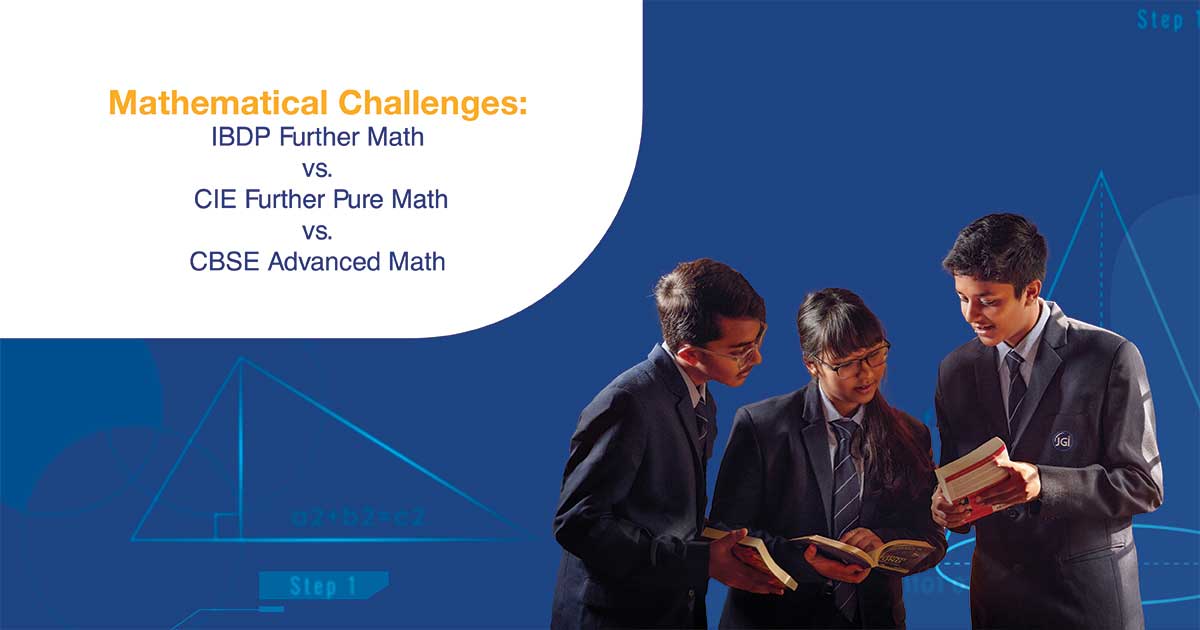

Mathematics is a compulsory subject for many university programmes, especially Engineering, Architecture, Applied Sciences, Business Studies, Mathematics and Finance. IBDP programme offers Standard Level and Higher Level (HL) alternatives for Mathematics with two courses - Analysis and Approach and Application and Interpretation. The HL alternative of the current Mathematics programme has replaced the Further Mathematics that IBDP offered between 2014 and 2020. CIE’s AS & A Level Further Pure Mathematics course takes A-Level Maths as a foundation subject and delves deeper into Mathematical concepts. CBSE curriculum is designed to promote objective reasoning skills among learners, thus, its Advanced Maths course is competitive. Let us take a look at the mathematics courses offered by the three Boards.
Syllabus and curriculum: IBDP Further Math
IBDP Further Math is an HL subject and has 6 subjects -
IBDP Further Math assessment has internal and external assessments. The external assessment consists of three written papers and the internal assessment comprises a project and coursework. Learners have to write a Theory of Knowledge assignment and complete assignments along with giving the final exams.
Syllabus and curriculum: CIE Further Pure Math
To qualify for AS or A level Further Pure Mathematics, learners must have studied the majority of the Cambridge International AS & A Level Mathematics or studied their course content. CIE AS & A Level Further Pure Math is divided into 4 Papers.
| Paper 1 - Further Pure Mathematics 1 | Paper 2 - Further Pure Mathematics 2 | Paper 3 - Further Mechanics | Paper 4 - Further Probability & Statistics |
| Roots and polynomial equations, Rational Functions and graphs, Summation of Series, Matrices, Polar coordinates, Vectors, Proof by Induction | Hyperbolic Function, Matrices, Differentiation, Integration, Complex Numbers, Differential Equations, | Motion of a projectile, Equilibrium of a Rigid Body, Circular Motion, Hooke’s Law, Linear motion under a variable force, Momentum, | Continuous random variables, X2 -tests, non-parametric tests, Probability generating functions, |
AS Level Further Mathematics learners can choose one of the Paper options:
A Level Further Pure Mathematics learners will pick all four papers.
There will be a written examination for each paper, which will be assessed externally.
Syllabus and curriculum: CBSE Advanced Math
The syllabus for the CBSE Advanced Math course covers topics such as Sets and Functions, Algebra, Calculus, Vectors and three-dimensional geometry, Linear Programming, and Statistics and Probability. The learner will take one Board exam at the end of the year which will be a written test worth 80 marks. They will also take an internal assessment which will include periodic tests worth 10 marks and mathematics activities worth 10 marks.
Who should take IBDP Further Math/CIE Pure Math/CBSE Advanced Math?
Only those who have a high aptitude for Mathematics and a background in the subject must attempt the advanced Mathematical courses in IBDP and CIE curriculum. The course curriculum is rigorous and deep, and that is why only students who meet the pre-set criteria in terms of the subjects they have studied, and their grades are allowed to take the course. CBSE’s Advanced Math programme is available only to students who have opted for the Science and Commerce streams.
If you are planning to pursue a career in pure science subjects such as Physics, Chemistry, or in the field of technology, then advanced Mathematics will be a pre-requisite. The university programme will specify the course curriculum and the basic requirements for prospective candidates. If you are planning to pursue a career in Management or media studies or take Humanities courses in college, then you needn’t take Further Math courses. The basic or foundational Mathematics courses in IBDP and CIE will be adequate.
Closing thoughts
Mathematics is an interesting subject with applications across various fields and even outside them. However, further mathematics courses delve into complex mathematics and explore their applications in diverse ways. The assessments are also challenging, and course requirements can be daunting if you are unable to comprehend the concepts. Hence, schools also offer the course only to students who have proven mathematical skills to ensure they can handle the rigours of the curriculum and do well in the course.
Recent Blogs
Site Designed and Maintained By : Office of Communications, JAIN Group All rights reserved.